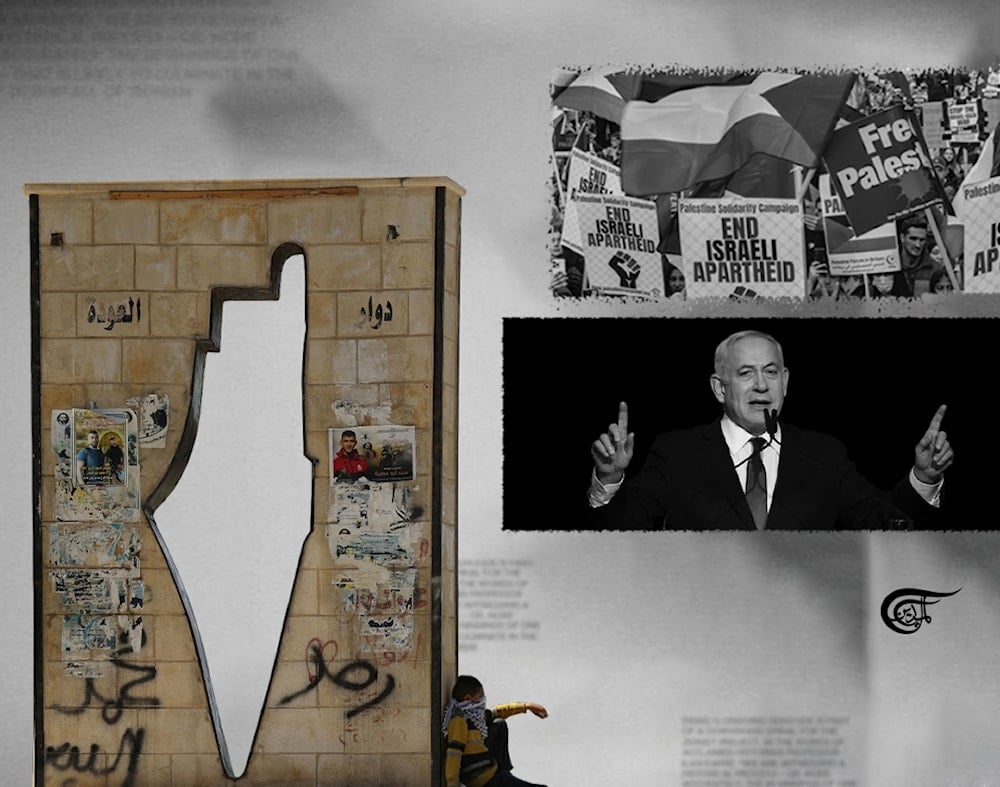The parallel struggle of Liberal Zionism
Tim Anderson examines how Liberal Zionism seeks to redirect global outrage at "Israel’s" genocide in Gaza into a controlled settlement that preserves colonial privilege.
-

Even if apartheid is dismantled or a Palestinian state is recognised, Liberal Zionists will use their influence to create a ‘deal’ with compliant elements of the Palestinian and Arab elites. (Al Mayadeen English; Illustrated by Batoul Chamas)
The recent conversion of many Western politicians and media commentators from open supporters of the Gaza genocide to weak critics (tough words, no action) of the Netanyahu regime is no accident.
Of course, these weasels are concerned to restore their plummeting credibility in face of the worldwide rejection of Zionist atrocities, but they also have their way paved by Liberal Zionists who want to redirect the moral force of Palestinian solidarity into a historical compromise which preserves many aspects of Jewish colonial privilege.
Liberal Zionists, including most North American Jews, have long hated Netanyahu and other openly fascist Zionists for destroying their dream of a nicer, kinder colonial regime. Most still speak of a ‘two-state solution’.
Almost anything might seem like a haven after two years of the genocidal slaughter in Gaza and the open Israeli commitment to systematic child killing and a ‘final solution’ for Gaza.
But important compromises appear immediately when there is any move towards recognition of a Palestinian state. UN Special Rapporteur Francesca Albanese warned in 2022 that “Dismantling the Israeli apartheid… will not automatically address the question of Israeli domination over the Palestinians, restore permanent sovereignty over the lands Israel occupies … nor … fulfill Palestinian political aspirations”.
‘Two states’ is a well-established but obsolete UN position which has not been updated to take into account the multiple reports that branded "Israel", well before the Gaza genocide, as an apartheid regime and therefore a crime against humanity which must be dismantled. It is the deep racism of apartheid which has led to the current genocidal slaughter.
Even if Netanyahu were overthrown tomorrow and apartheid in historic Palestine were dismantled, key challenges would remain over what to do about historic land theft, the right to return for millions of refugees, and questions of justice over the multiple mass murders. And in that scenario, the voice of Liberal Zionism, in support of Jewish colonial privilege and backed by its Anglo-American sponsors, would become very important.
As I argued in my 2023 book West Asia After Washington, a collapse in the current Israeli regime would likely lead to a second stage of struggle over those compromises, and not a clean break into a free and democratic Palestine. We have seen the results of these bad compromises in the dismantling of other racist states - Rhodesia/Zimbabwe, Namibia and South Africa - where massive land and economic inequality problems remain.
The dismantling of Israeli apartheid and the creation of a single democratic state is a worthy goal, but the details are important. Back in January 2020, Trump presented his version of a Palestinian ‘state’ and – like Apartheid South Africa’s Bantustan proposal of the 1980s – it was awful and was rejected by all Palestinian parties. This ‘Palestinian state’ was a non-sovereign body – not much different to the Palestinian Authority today, really a municipality of the Israeli regime – with a fragmented patchwork of remaining, uncolonised land on the West Bank.
Nelson Mandela’s grandson, Mandla Mandela, has campaigned against this Bantustan like ‘two states’ proposal, calling for a single democratic state. He says, with some moral authority, that the ‘two states’ idea “hides apartheid and prevents the construction of a broad anti-apartheid movement”.
Although the battered idea of a ‘two state solution’ still has some international currency, because of a series of UN resolutions, those who hold it out as an ideal are mainly liberal Zionists who want to legitimise the Jewish colony, escaping both the genocidal stain and the apartheid brand.
The problem with Liberal Zionism lies in its main aim: to rescue the Israeli dream by distancing itself from and denouncing the genocidal Netanyahu version. That rescue could involve anything from two states to a single democratic state where apartheid is dismantled but special Jewish privilege is maintained in parts of the post-1967 occupied territories.
It is clear that openly fascist forces dominate the Netanyahu-led Israeli colony today, but not Zionism worldwide. Liberal Zionists remain very influential in the USA, despite the recent setbacks for their natural home in the US Democrat Party.
That includes many who have been vehement and articulate critics of the slaughter in Gaza, like Jeffrey Sachs, a former US diplomat, academic, and advisor to the UN and the World Bank. In recent times, Sachs has been a consistent and powerful opponent of the crimes of the Netanyahu regime. He argues that Netanyahu is “creating an absolute disaster for Israel” and claims that the ‘two states’ notion is “the only viable path” to peace.
There are even some courageous acts of resistance by liberal Zionists. Ben Cohen, a US businessman and co-founder of Ben & Jerry's ice cream company, has campaigned against Zionist atrocities. He was recently arrested in Washington while protesting military aid to "Israel" and the blockade of Gaza. Yet Ben wants ‘two states’, preserving a ‘nicer, kinder’ "Israel".
Similar arguments come from former Israeli officials, like Daniel Levy, president of the U.S. /Middle East Project and alienated from the regime since the Netanyahu era. Levy argues a dialectic, that “we are witnessing, at one and the same time, the increasing impossibility and unviability of the two-state solution and, at the same time, the surprising resilience of the two-state paradigm.”
Former orthodox Zionist Peter Beinart has also joined the liberal critics and has moved away from the two state notion to support for a single democratic state, but one with a Jewish character. He argues that “an increasing number of American Jews reject the idea of a Jewish state”.
Liberal Jews, who see themselves are tolerant and anti-racist, are repulsed by the apartheid brand. Two former Israeli Prime Ministers, Ehud Barak and Ehud Olmert, both from the Israeli Labor Party, have argued that if the two state project disappears, there will be no alternative to the South African road and dismantling apartheid.
The Israeli Labor Party was the traditional base for liberal Zionism within the colony, even though many of its leaders had participated in the worst of Zionist terrorism. Yigal Allon, for example, a former Haganah terrorist in the 1930s and army commander during the Nakba massacres, became Israeli Prime Minister briefly in 1969. His ‘Allon Plan’ argued for divide and rule in the region but also for returning some of the occupied territories (after the 1967 war) to Arab control.
By contrast, the ‘Yinon Plan’ of 1982, argued by Likud adviser Oded Yinon, was a more comprehensive strategy for occupying and dominating the entire region.
The late Yitzhak Rabin, the Israeli Labor Prime Minister who signed the Oslo peace accords with the PLO, spoke of a freeze of ‘settlements’ in the West Bank but invested billions in infrastructure for those same settlements, leading to their expansion.
In other words, both factions presided over expanded colonisation, but the Liberals at times, could contemplate a weak, marginalised Palestinian state in exchange for greater recognition of the Israeli regime under a ‘two state solution’, legitimising all the land theft since the 1960s.
Nevertheless, recognising the contradictions of this remnant ‘two states’ policy, a number of liberal Zionists now speak of a version of a single democratic state with special Jewish cultural features.
Perhaps the most developed version of this comes from the “A land for all: Two States. One Homeland” project, developed by some Israeli liberal writers and lawyers with Palestinian collaborators. Led by Meron Rapoport, a former Israeli journalist at Haaretz, this is an idealised project of reconciliation which “allows members of both nations to travel and live throughout the shared homeland, without undermining their right to self-determination and their ability to exercise this right”.
The most intelligent Liberal Zionists remain focused on how to coopt the very popular Free Palestine movement, which has grown massively since the Gaza slaughter. While reluctant to give up the two state myth, this liberal Zionist reasoning maintains that “the question of how to direct the Palestinian national struggle remains as relevant as ever”. That is, they want to lead and redirect Palestinian “liberation”.
Those ‘one democratic state’ arguments are quite different to that proposed by Palestinian groups – a single, secular democratic state, for all its citizens, from the river to the sea – and by Iran, the main patrons of the Palestinian resistance. Back in 2011, Iranian Leader Ayatollah Ali Khamenei set out his one democratic state referendum proposal in this way:
“We do not suggest launching a classic war by the armies of Muslim countries, or throwing immigrant Jews into the sea, or mediation by the U.N. and other international organizations. We propose holding a referendum with [the participation of] the Palestinian nation. The Palestinian nation, like any other nation, has the right to determine its own destiny and elect the governing system of the country”. Khamenei proposes a referendum of all residents in and refugees from historic Palestine, to determine their own future.
The combined forces of the Palestinian resistance and the rising, mostly self-inflicted international illegitimacy of "Israel" remain the most powerful forces working towards a democratic Palestine. But Palestinians will not automatically determine the outcomes; the anti-Netanyahu Liberal Zionist camp is bound to have a say.
When the Netanyahu regime collapses, and whatever the transitional outcomes, the land question will remain particularly important in Palestine, where steady land grabs, house thefts and demolitions, have economically and geographically marginalised the indigenous population, exposing as an absurdity the idea of partition into ‘two states’.
In sum, even if apartheid is dismantled, or a Palestinian state is recognised, Liberal Zionists will use their influence with the Anglo-Americans to create a ‘deal’ with compliant elements of the Palestinian and regional Arab elites. Almost certainly that emerging deal will involve (as it did in South Africa, Namibia, and Zimbabwe) specific protection of ‘settler rights’, entrenchment of Zionist privileges, and a freeze on land redistribution. The Palestinian ‘right to return’, which affects many millions, is also likely be restricted. Beware of a pending bad deal.

 Tim Anderson
Tim Anderson
 10 Min Read
10 Min Read











